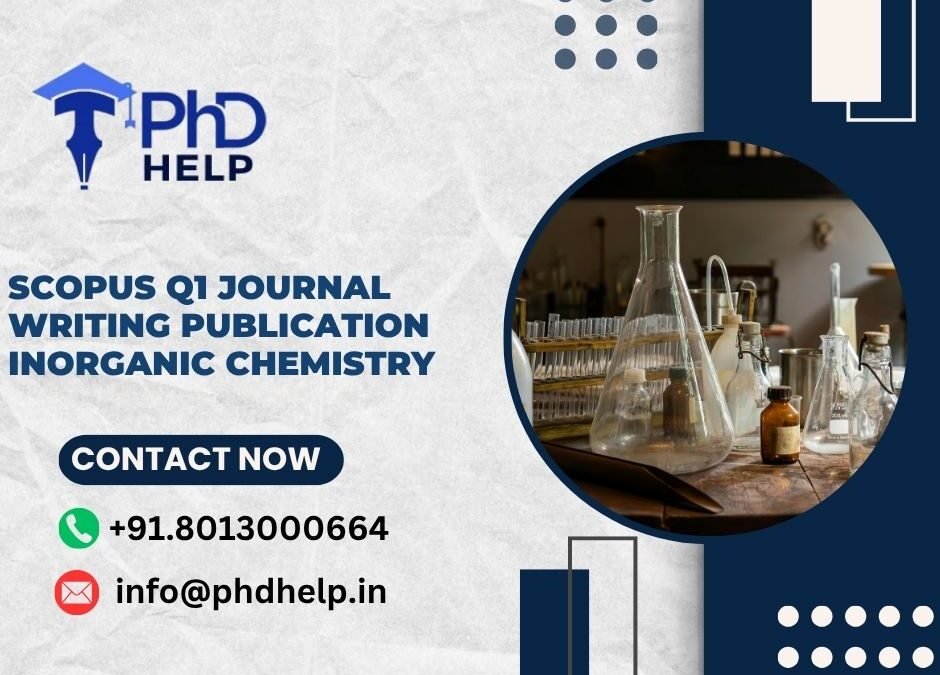SCOPUS Q1 journal writing publication Inorganic Chemistry
SCOPUS Q1 journal writing publication Inorganic Chemistry. Publishing research in SCOPUS Q1 journals in Inorganic Chemistry represents a significant academic milestone, showcasing scientific excellence and global recognition. At our professional writing service, we provide comprehensive journal writing, editing, and publication support tailored for researchers, academicians, and scientists aspiring to publish their work in high-impact journals within the field of Inorganic Chemistry.
Understanding SCOPUS Q1 Journals in Inorganic Chemistry
SCOPUS, one of the largest abstract and citation databases, categorizes journals into quartiles (Q1–Q4) based on impact metrics such as CiteScore, SJR (SCImago Journal Rank), and SNIP (Source Normalized Impact per Paper).
A Q1 journal is ranked in the top 25% of journals in a specific field, indicating outstanding reputation, citation influence, and peer-review standards. In Inorganic Chemistry, Q1 journals publish groundbreaking research on coordination chemistry, bioinorganic chemistry, solid-state materials, organometallics, and catalysis.
Core Areas of Research in Inorganic Chemistry for Q1 Publication
Publishing in a SCOPUS Q1 journal requires focusing on innovative and globally relevant topics. Some prominent areas include:
-
Transition Metal Complexes: Design and synthesis of coordination compounds with catalytic or electronic applications.
-
Organometallic Chemistry: Mechanistic studies of metal-carbon bonds influencing modern catalysis.
-
Bioinorganic Systems: Understanding metalloproteins, metalloenzymes, and metal ion transport in biological systems.
-
Nanomaterials and Clusters: Development of functional nanostructures for sensors, energy, and environmental applications.
-
Inorganic Reaction Mechanisms: Kinetic and thermodynamic insights into ligand substitution and redox reactions.
-
Solid-State and Materials Chemistry: Structural analysis of inorganic compounds for advanced materials and electronic devices.
Each of these topics demands experimental rigor, analytical precision, and a strong theoretical framework to attract acceptance from Q1 journals.
Essential Structure for a Q1 Journal Manuscript
A well-structured manuscript significantly increases the chance of acceptance. We emphasize a systematic scientific writing approach, including:
1. Title and Abstract
Craft a clear, concise, and keyword-rich title. The abstract must summarize objectives, methods, major findings, and implications in 200–250 words.
2. Introduction
Highlight the research gap, scientific significance, and objectives. Support claims with recent citations from high-impact journals.
3. Experimental Section
Provide comprehensive methodological details ensuring reproducibility — instrumentation, synthesis procedures, and analytical methods should be precisely stated.
4. Results and Discussion
Present data logically with figures, spectra, and tables. Interpret findings in light of theoretical models and comparable studies, ensuring the discussion demonstrates novelty and application potential.
5. Conclusion
Summarize key outcomes, implications, and potential future research directions concisely.
6. References
Follow the referencing style of the target Q1 journal, ensuring accuracy and citation of high-impact, recent studies.
Popular SCOPUS Q1 Journals in Inorganic Chemistry
Here are some globally recognized SCOPUS Q1 journals where high-quality inorganic chemistry research is published:
These journals are known for their rigorous peer-review process, high citation impact, and extensive readership among chemists worldwide.
Strategies to Increase Acceptance in Q1 Journals
Publishing in a SCOPUS Q1 journal demands more than good research—it requires strategic manuscript development. Our expert editors recommend:
-
Selecting the Right Journal: Match your manuscript’s focus and methodology to the aims and scope of the journal.
-
Emphasizing Novelty: Demonstrate clear innovation or improvement over existing methods or theories.
-
Data Presentation: Use high-resolution figures, XRD, NMR, and spectroscopic data to support your findings.
-
Language and Style: Maintain scientific precision and grammatical accuracy throughout the paper.
-
Compliance with Guidelines: Adhere strictly to journal-specific submission and formatting requirements.
-
Citations and Impact: Reference key works published in top-tier journals to enhance credibility.
How We Assist in SCOPUS Q1 Journal Publication
We provide end-to-end publication support for researchers aiming at Q1 journals in Inorganic Chemistry. Our services include:
-
Topic Selection and Literature Review: Identifying research gaps and aligning study design with journal trends.
-
Scientific Writing and Editing: Structuring content for clarity, coherence, and impact.
-
Journal Selection Assistance: Matching manuscripts with suitable SCOPUS-indexed Q1 journals.
-
Plagiarism Check and Similarity Reduction: Ensuring originality with industry-standard tools.
-
Peer Review and Revision Support: Addressing reviewer comments effectively for resubmission.
Our team comprises PhD-qualified chemists, journal editors, and citation analysts who understand the rigorous standards of Q1 publications.
Why Publish in a SCOPUS Q1 Inorganic Chemistry Journal?
Publishing in Q1 journals enhances academic credibility, citation visibility, and global collaborations. It also strengthens grant applications, professional recognition, and university rankings. Moreover, Q1 journals attract multidisciplinary readership, ensuring your research contributes meaningfully to the scientific and industrial advancements of Inorganic Chemistry.
Final Thoughts
A successful SCOPUS Q1 journal writing publication in Inorganic Chemistry requires strategic research design, strong data interpretation, and professional scientific writing. By adhering to high publication ethics and quality standards, researchers can ensure their work makes a meaningful contribution to global chemical sciences.
If you aim to publish your research in a top-tier SCOPUS-indexed Q1 Inorganic Chemistry journal, professional guidance can make a decisive difference.
Thank you for read our blog “SCOPUS Q1 journal writing publication Inorganic Chemistry”
Also read our more BLOG here
For PhD writing help Contact: +91.8013000664 || info@phdhelp.in

